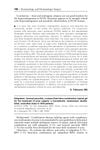September 2024 in “Journal of Ayurveda and Integrative Medicine” Ayurvedic treatments can improve symptoms and quality of life for systemic sclerosis patients.
 April 2023 in “Journal of Investigative Dermatology”
April 2023 in “Journal of Investigative Dermatology” Sweating can potentially be controlled through olfactory receptors, with β-ionone playing a key role, and responses may vary between genders.
 July 2022 in “Dermatology practical & conceptual”
July 2022 in “Dermatology practical & conceptual” Henna ointment may help reduce itching and improve wound healing in patients with epidermolysis bullosa.
Excessive vitamin A intake caused severe health issues that mostly resolved after stopping the intake.
 March 2017 in “European Urology Supplements”
March 2017 in “European Urology Supplements” Gene differences affect finasteride side effects in men with hair loss.
 1 citations,
April 2016 in “CRC Press eBooks”
1 citations,
April 2016 in “CRC Press eBooks” Skin aging reflects overall body aging and can indicate internal health conditions.
 1 citations,
June 2019 in “Current developments in nutrition”
1 citations,
June 2019 in “Current developments in nutrition” A patient with Ehlers-Danlos Syndrome improved after treatment for fat malabsorption and essential fatty acid deficiency.
 January 2011 in “Yearbook of Dermatology and Dermatologic Surgery”
January 2011 in “Yearbook of Dermatology and Dermatologic Surgery” The adapalene-benzoyl peroxide gel works better and faster for acne treatment than using either ingredient alone, with manageable side effects.
 January 2011 in “Web journal anti-aging medicine/Anti-aging medicine”
January 2011 in “Web journal anti-aging medicine/Anti-aging medicine” KGS1 tablets improved skin and hair health.
 September 1999 in “The Journal of The British Menopause Society”
September 1999 in “The Journal of The British Menopause Society” The document concludes that skin aging in women can be caused by UV exposure and hormonal changes, and treatments like hormone replacement therapy and various skin therapies can help.
 120 citations,
October 2007 in “Clinical Interventions in Aging”
120 citations,
October 2007 in “Clinical Interventions in Aging” Estrogens help reduce skin aging, and SERMs might offer similar benefits without the risks of hormone therapy.
 48 citations,
May 2015 in “NPJ microgravity”
48 citations,
May 2015 in “NPJ microgravity” A 3-month stay in space causes skin thinning, disrupts hair growth, and changes muscle-related genes in mice.
 27 citations,
September 2009 in “British journal of nursing”
27 citations,
September 2009 in “British journal of nursing” Nurses should know about different moisturizers to help patients with dry, itchy skin choose the best one.
 11 citations,
September 2007 in “Advances in therapy”
11 citations,
September 2007 in “Advances in therapy” INVERSION Femme supplement helped women lose weight, reduce hair loss, and improve skin and nail health.
 5 citations,
March 2021 in “International Journal of Dermatology”
5 citations,
March 2021 in “International Journal of Dermatology” Biotin supplementation during isotretinoin treatment for acne may help maintain skin hydration and improve hair growth.
 5 citations,
November 2007 in “British journal of nursing”
5 citations,
November 2007 in “British journal of nursing” Nurses should treat emollients as medications, understanding their use and effects for treating skin conditions.
 3 citations,
October 2023 in “Frontiers in physiology”
3 citations,
October 2023 in “Frontiers in physiology” ceRNA networks offer potential treatments for skin aging and wound healing.
 156 citations,
August 2016 in “Journal of controlled release”
156 citations,
August 2016 in “Journal of controlled release” Tight junctions are key for skin protection and controlling what gets absorbed or passes through the skin.
 77 citations,
July 2020 in “Journal of the European Academy of Dermatology and Venereology”
77 citations,
July 2020 in “Journal of the European Academy of Dermatology and Venereology” Environmental factors, hormones, nutrition, and stress all significantly affect skin health and aging.
 77 citations,
July 2013 in “Best Practice & Research in Clinical Obstetrics & Gynaecology”
77 citations,
July 2013 in “Best Practice & Research in Clinical Obstetrics & Gynaecology” Menopause reduces skin collagen and elasticity, and while estrogen therapy can help, its risks require careful consideration.
 47 citations,
September 2016 in “Reviews in endocrine and metabolic disorders”
47 citations,
September 2016 in “Reviews in endocrine and metabolic disorders” The skin's ability to produce hormones is linked to various skin conditions, and better understanding this process could lead to new treatments.
 31 citations,
May 2012 in “European Journal of Dermatology”
31 citations,
May 2012 in “European Journal of Dermatology” Menopause affects hair and skin; more research needed for treatment.
 28 citations,
December 2006 in “Clinical lung cancer”
28 citations,
December 2006 in “Clinical lung cancer” Early recognition and management of skin side effects from new cancer therapies can prevent treatment delays.
 24 citations,
March 2015 in “Best Practice & Research in Clinical Obstetrics & Gynaecology”
24 citations,
March 2015 in “Best Practice & Research in Clinical Obstetrics & Gynaecology” Some skin conditions are common during pregnancy and can be safely treated without affecting the pregnancy outcome.
 20 citations,
May 2020 in “Experimental Dermatology”
20 citations,
May 2020 in “Experimental Dermatology” Aging scalp skin contributes to hair aging and loss, and more research is needed to develop better hair loss treatments.
 19 citations,
October 2008 in “Journal der Deutschen Dermatologischen Gesellschaft”
19 citations,
October 2008 in “Journal der Deutschen Dermatologischen Gesellschaft” Anti-cancer treatments can cause reversible hair loss, skin sensitivity, pigmentation changes, nail damage, and skin reactions, with a need for more research on managing these side effects.
 17 citations,
July 2017 in “International Journal of Behavioral Medicine”
17 citations,
July 2017 in “International Journal of Behavioral Medicine” The Egyptian Arabic Skindex-16 is a reliable way to measure how skin diseases affect quality of life in Egyptian patients.
 16 citations,
January 2006 in “The Aging Male”
16 citations,
January 2006 in “The Aging Male” Hormone imbalances can cause skin diseases, and understanding these links is important for diagnosis and treatment.
 8 citations,
June 2021 in “Journal of Cosmetic Dermatology”
8 citations,
June 2021 in “Journal of Cosmetic Dermatology” The review found that COVID-19 can cause skin problems, including rashes and issues from wearing PPE, and suggests more research and protective measures for healthcare workers.
 7 citations,
October 2019 in “Elsevier eBooks”
7 citations,
October 2019 in “Elsevier eBooks” Maintaining skin health is crucial for overall well-being and involves protecting against environmental damage and using skincare products.



























